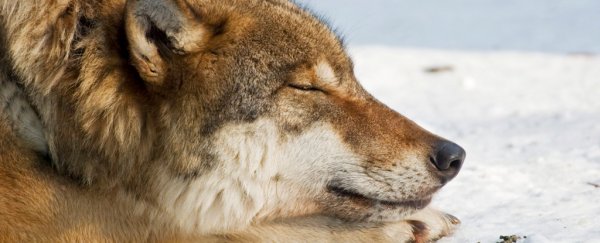Studying the sleep patterns of wolves in comparison to dogs can give us an insight into how evolution and domestication may have affected sleep – and that's exactly the point of a new study.
The study involved seven hand-raised, socialized wolves, which meant that they could be calmly and safely coaxed into natural sleep by their handlers without any risk of agitating or harming the animals.
Researchers then used non-invasive electrode measurements via an electroencephalogram, or EEG, to track brain activity as each wolf snoozed.
It's the first time that the sleeping habits of wolves, the dog's closest wild relative, have been studied.
"Although dog-wolf comparative studies have already been conducted in several areas of research, including behavioral and genetic studies, the neural processes of wolves remain a largely unexplored field," says ethologist Anna Bálint from the MTA-ELTE Comparative Ethology Research Group in Hungary.
"We successfully measured all sleep stages – drowsiness, deep sleep, and REM – that were previously observed in dogs as well."
Trying to track wolves in nature is obviously quite a challenge because of where they live and how frequently they move around – and monitoring them while they sleep is even harder. As such, this is the first bit of solid data researchers have to go off.
The results obtained from the wolves were compared with data previously recorded on family dogs.
The researchers noticed a lot of similarities: Our canine friends and wolves seem to spend a similar amount of time in different sleep stages, while older animals across both species log less 'slow wave' brain activity, or deep sleep, than the youngsters.
 A sleeping young wolf with electrodes attached. (Department of Ethology/Eötvös Loránd University)
A sleeping young wolf with electrodes attached. (Department of Ethology/Eötvös Loránd University)
But there are variations, too. Wolves log more REM sleep, which in humans is linked to dreaming. And the older the animal, the bigger this difference is.
"This finding is especially intriguing since the amount of REM sleep has been linked to various different effects including neurodevelopment, stress, domestication, but also memory consolidation," says first author ethologist Vivien Reicher from MTA-ELTE.
As time goes on, we're learning more and more about how and why animals sleep. When it comes to human beings, sleep can have a major effect on multiple facets of our mental and physical health, but there are still questions about how much sleep we actually need.
So, looking at how dogs have adapted their sleep patterns in response to domestication could also teach us how human sleep has evolved. Our species has also gone from living wilder, outdoor, less protected lives, to having days that are more controlled and not so reliant on natural rhythms thanks to advances such as electricity and the lightbulb.
Due to the small sample size and the uneven age distribution of the wolves, scientists won't be making any broad conclusions from the findings here – but they are an interesting starting point for future study.
"We suggest that using our reliable, easily applicable methodology in different labs may form the basis of an international, multi-site collection of similar samples, allowing for generalizable scientific conclusions," says ethologist Márta Gácsi from MTA-ELTE.
The research has been published in Scientific Reports.
